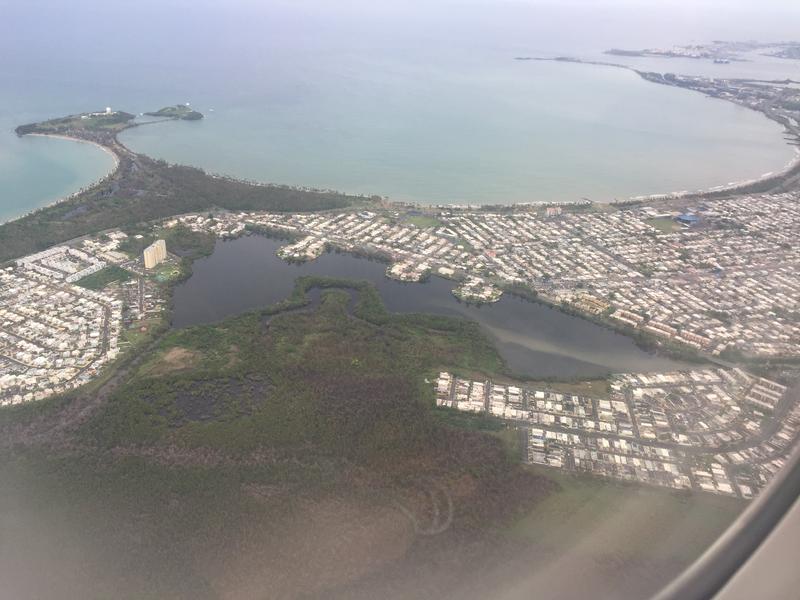ALANA CASANOVA-BURGESS: In June, before Maria, before Irma, before everything changed, I spoke with the Puerto Rican radio and TV host Jay Fonseca about the challenges the island faced, even then, and the mistaken impression among some mainland politicians that islanders just want federal handouts.
JAY FONSECA: I think that we’re not that different, that we are struggling the same way the Rust Belt or the Bible Belt is struggling right now, or parts of Pennsylvania, parts of Ohio. We have the same problems with drug addiction, for example. And the Puerto Ricans, we’re not lazy people. We, we want to work. We want jobs. We want to provide for our families.
ALANA CASANOVA-BURGESS: I still agree with Jay. Puerto Rico has been shaped in the image of the United States in so many ways, the big box stores, the corporate tax cuts, the political logjams, the scapegoating of the poor. The island has long been a laboratory for the US, sometimes literally. Puerto Rican women who were research subjects in developing the birth control pill, for example, didn’t even know they were guinea pigs. And in the Cold War, while the Soviet Union used Cuba as a poster island, the US used Puerto Rico as a showcase for capitalism. But what it now displays is skyrocketing debt, soaring unemployment and a vast gulf between the few rich and the many, many poor, Sandra Rodriguez Cotto.
SANDRA RODRIGUEZ COTTO: So having this island that was supposed to have so much money turn into this chaos and economic chaos for a decade and being basically bankrupt was a story, and Puerto Rico was being showcased all over the world as the new Greece.
ALANA CASANOVA-BURGESS: And now, in a season of so many strong hurricanes, it was Puerto Rico that took the most devastating blow. But it could have been anywhere, and chances are, sooner or later, it will be.
ALFREDO CORRASQUILLO: Let’s remember the context, which is climate change, a global warming.
ALANA CASANOVA-BURGESS: Psychoanalyst Alfredo Corrasquillo wasn’t the only one who made this point to me. And when I arrived in Puerto Rico, seven weeks after Maria, I met people who still hadn't taken their storm windows down because they feared another hit. Now, this hurricane season is over but the clock is already ticking for Puerto Rico and everywhere else.
ALFREDO CORRASQUILLO: It’s not gonna be 20 years before we get the next one, so are we rebuilding our infrastructure so that that infrastructure is destroyed again in a year or in two years? It’s absurd, eh? So what should we be doing differently, at this point? And that is the type of conversation that we are desperately needing.
ALANA CASANOVA-BURGESS: In the Cold War, the US held up Puerto Rico as the emblem of the American way. Now, crippled by climate change, struggling with addiction and torn by yawning inequality, it seems a different kind of reflection. But Puerto Rico is dynamic. It could still function as a kind of lab for fixing things, getting things right, for the mainland too.
[MUSIC UP & UNDER]
BOB GARFIELD: That’s it for this week’s show. On the Media is produced by Alana Casanova—Burgess, Jesse Brenneman, Micah Loewinger and Leah Feder. We had more help from Jon Hanrahan, Monique Laborde and Sarah Chadwick Gibson. And our show was edited -- by Brooke. Our technical director is Jennifer Munson. Our engineers this week were Sam Bair and Terence Bernardo.
Thank you also to Rob Christensen, Maria Cristina Rodriguez, Lowell Fiet, Lucinda Williams, Anna Casanova, Olga Casanova-Burgess and Pablo Ripoyez.
BROOKE GLADSTONE: Katya Rogers is our executive producer. Jim Schachter is WNYC’s vice president for news. Support for WNYC’s coverage of Puerto Rico has been provided in part by the Jacob & Valeria Langeloth Foundation. On the Media is a production of WNYC Studios. I’m Brooke Gladstone.
BOB GARFIELD: And I’m Bob Garfield.

